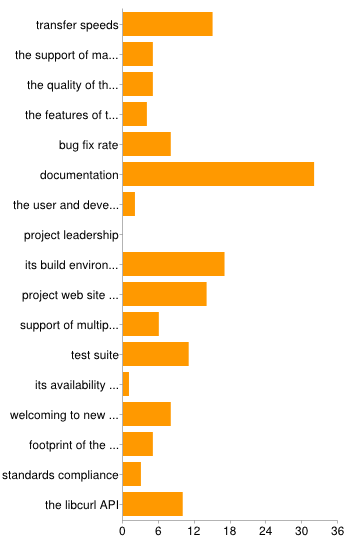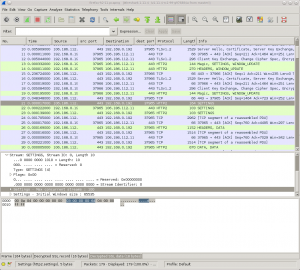Reading through the answers to the curl project‘s survey “curl and libcurl 2014” is very interesting and educational.
After having lead and participated in this project for so long I have my own picture of what we’re good and bad at. That’s not exactly the same image I get when I read the survey responses. That’s of course the educating part and I really want to learn from this poll and see where to put in some efforts and attempt to improve. At the same time I’ve been working for a while to put together a roadmap for the project, and the survey will help guide us with that work as well.
The full generated summary of the answers can be found on the site, but I thought I do the extra effort here and try to extrapolate data, compare and try to get to the real story that lurks in the shadows.
Over the almost 10 days the poll was open, we received 194 responses. I was hoping for more participation, but on the other hand I don’t think more people would’ve given a much different view. My only concern would be that I’m not sure exactly how well we reached out.
Almost all curl users use it for HTTP and HTTPS. Sure, we also use a lot of other protocols and in fact all supported protocols did up having at least two users according to the survey, but only a single digit percentage did not mark HTTP and HTTPS as protocols they use. The least used supported protocol gopher, is used among 1.5% of the users who responded.
FTPS and SFTP are basically equally much used and they are the 4th and 5th most used protocols. HTTP, HTTPS and FTP are clearly our most popular protocols.
Only one in five users use curl on a single platform. All others use it on two or more, and one if four use it on four or more with an unexpectedly high 11% saying they use it on 5 or more platforms! That’s a pretty strong message to me that our multi-platform strategy is important.
Our users have been with us for a long time. Half of the users have been using curl for five years or more! A fifth has been with us for 8 years or more! And yet there seems to be a healthy amount of newcomers finding us as 14% is within their first year.
The above numbers combined, I’m not surprised but only happy to see that 4 out of 5 users are also involved in other open source projects. curl is just one piece in a large ecosystem and I think it is good that we all participate in several projects so that we learn and cross-pollinate where possible!
Less than half of the respondents are subscribed to a curl mailing list, and curl-library is the most popular one. This also reflects in subscriber numbers on the actual mailing lists where curl-library with its 1400+ members has almost twice as many subscribers as curl-users. One way to view this is that we are old enough, established enough and working enough so that users don’t have to subscribe to our lists to keep up. The less optimistic way to see it could be that this is because we haven’t reached out good enough or that our mailing list culture/setup isn’t welcoming enough.
Perhaps most surprising to me: that several persons got upset and reacted strongly to the question about how good we treat “female and other minorities” in the project. To me there’s no doubt that female contributors are a minority in the curl community and I want to learn if we’re doing our best to be inclusive and open to all possible contributors. Or at least how good/bad people think we are doing.
29% of the respondents have contributed patches, meaning 56 individuals. I think that tells more about the ones who took part of the survey than it measures participation level among “regular users”.
Documentation
A big revelation for me was the question where I asked people to identify the “worst parts” of the project. The image here below is the look of the summary.
It quite clearly identifies “documentation” as the area in most need of improvements.
I don’t think the amount of docs is the problem. After discussing with people I think the primary issues are:
- Some collections of docs are just too big and hard to find in, like the curl man page and the curl_easy_setopt man pages. We need to split them up and/or rearrange somehow to help people find the info they need. Work has started on this. I’ll follow up with details later.
- We get slightly bad “reviews” on this when people confuse the libcurl bindings’ lack of docs to be our problem. Lots of libcurl bindings are not very good documented – but they are separate projects not controlled or documented by us. I don’t know what we can do to help that situation. Suggestions are very welcome!
- We don’t have much step-by-step tutorials on how to get started and how to knit things together. We mostly provide reference manuals. I will appreciate help with improving this!



 One of the first bugs that fell into my lap when I started working for
One of the first bugs that fell into my lap when I started working for 


